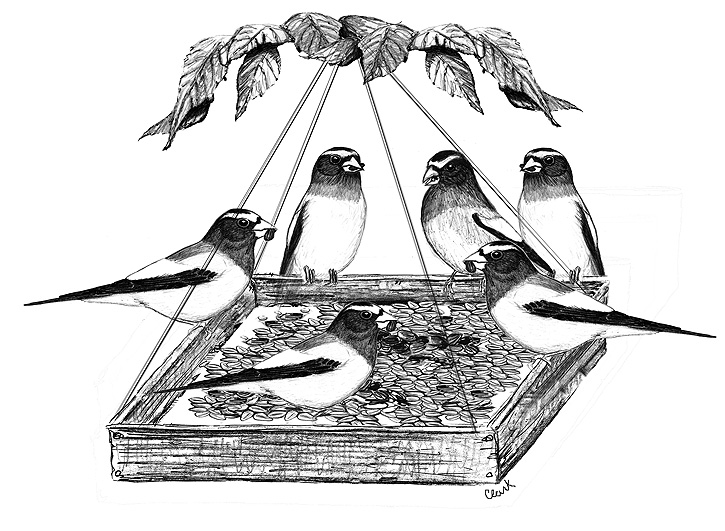
Dear Bird Folks,
I’ve read about this year’s influx of Pine Siskins and Red-breasted Nuthatches. What about Evening Grosbeaks? Any chance we could see them return this winter, too?
– Chris, Chatham, MA
There’s a chance, Chris,
In the birding world, there’s always a chance of finding something remarkable…except seeing a bluebird in my yard. That is never going to happen. Many of us fondly remember a time when Evening Grosbeaks were common winter visitors. Each year we were treated to large flocks of those flashy squabbling birds. But that was a long time ago, like the days of home milk delivery and phone booths. Will they be around this winter? The answer appears to be a qualified yes, but so far not in the same numbers as before. Although you are still likely to come upon more grosbeaks than phone booths and that’s too bad. It means I’ve been carrying all these dimes around for nothing.
The last time I had Evening Grosbeaks in my yard was about five years ago. Out of nowhere, four noisy females landed on my tray feeder and instantly began wolfing down copious amounts of sunflower seeds. After eating for a few minutes they all flew to a nearby tree, giving me a chance to grab my camera. With camera in hand I sat by the window and waited for them to return… and waited and waited. I’m still waiting. They never came back and I haven’t seen an Evening Grosbeak since. Sigh!
I was disappointed, but I get it. Evening Grosbeaks are not Cape Cod birds. They are birds of the northern forests. Like Pine Siskins, they only venture our way when they can’t find food. But as opposed to siskins, which are fairly drab and easily overlooked, there is no overlooking an Evening Grosbeak. The bright yellow males are as subtle as a Mardi Gras float and the females are pretty obvious as well. So named because they are supposedly more vocal at sunset, yet they actually can be heard chattering anytime of day. And one look at those massive beaks makes it apparent where the name “grosbeak” came from. FYI: Grosbeak is pronounced “grose-beak,” as in that huge beak is gross. Don’t rhyme gross with “toss.” If you do, people might not correct you on the spot, but they will talk about you later.
It has become clear that the grosbeaks I had on my feeder five years ago aren’t coming back. So, I decided to go look for them. Grosbeak reports have been coming in from all over the Cape, with most of them being spotted in Provincetown. That’s where I headed. Since the Cape is extra crowded this fall, I arrived at my favorite birding spot early (just after sunrise) in order to get a place to park. I was too late. The little parking area was already filled. I moved on. Eventually, I found a less hectic place and spent the next few hours hiking through the Province Lands. I saw a fair number of birds, including Purple Finches, redpolls, Pine Warblers and even a pair of Snow Geese, but not a single grosbeak. Many birders reported “hearing” them fly overhead, but that’s not really the experience I was hoping for. I needed to see them up close and personal. I made few more attempts the next day, but again with no luck. Then I got a tip from a customer. As I was loading a large bag of sunflower seeds into his car, I asked if he had seen any grosbeaks. He replied that he had “at least five-dozen of them” in his yard. There we go. That’s what I’m talking about. He also invited me to see them if I promised not to tell anyone else. I instantly promised, so just pretend that I didn’t mention any of what I’m about to tell you.
I located the address of the customer (whom I’ll call “Buster”) on my phone’s map app and magically sent the directions to the GPS in my car (don’t ask me how that works), and headed out early the next morning. Buster lives deep in the woods of the National Seashore, in an area where the roads are all dirt, narrow and sketchy. I was about a mile from his house when I decided that it would be safer for my car if I pulled over and walked the rest of the way. On the walk I saw no birds, no houses and no people. I began to wonder if I had been duped, but as soon as I rounded the corner I saw the house…and the grosbeaks, lots of them. In one tree alone I counted thirteen birds. It was a baker’s dozen, not five dozen, but close enough.
Not wanting to trespass through someone’s yard at 7:00AM, I watched the action from the dirt road, until a guy came out of the house to fill the birdfeeders. It was Buster. (I recognized him…and his birdseed.) He called me over and gave me the grand tour of his yard and his feeders. In addition to the grosbeaks, there were nuthatches, juncos, woodpeckers and lots of late-in-the-year Red-winged Blackbirds. I kept watching the birds as we continued to chat, until I decided I had taken too much of his time. I thanked Buster for sharing his yard and made the long walk back to my car, all the while wondering how he was able to attract so many cool birds to such a remote location. I guess he must use really good birdseed (wink).
There are indeed a lot of Evening Grosbeaks on the Cape this year, Chris. Whether they visit your yard or not is a matter of luck. Keep in mind they love black sunflower seed, especially when placed on trays and platforms. And if grosbeaks do arrive in your yard, please contact me right away by phone. I’ll even give you a dime for the call. I have plenty.